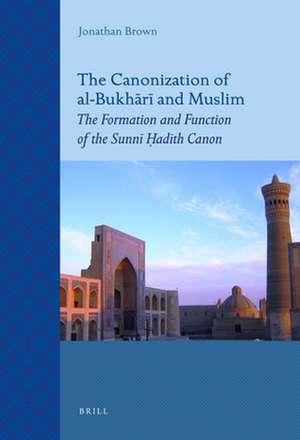The Canonization of al-Bukhārī and Muslim: The Formation and Function of the Sunnī Ḥadīth Canon
Autor Jonathan Brownen Limba Engleză Paperback – 10 oct 2011
Preț: 375.66 lei
Nou
Puncte Express: 563
Preț estimativ în valută:
71.89€ • 74.60$ • 60.09£
71.89€ • 74.60$ • 60.09£
Carte indisponibilă temporar
Doresc să fiu notificat când acest titlu va fi disponibil:
Se trimite...
Preluare comenzi: 021 569.72.76
Specificații
ISBN-13: 9789004211520
ISBN-10: 9004211527
Pagini: 432
Dimensiuni: 155 x 235 x 25 mm
Greutate: 0.7 kg
Editura: Brill
Colecția Brill
ISBN-10: 9004211527
Pagini: 432
Dimensiuni: 155 x 235 x 25 mm
Greutate: 0.7 kg
Editura: Brill
Colecția Brill
Notă biografică
Jonathan Brown (PhD 2006) is a professor of Islamic Studies in the School of Foreign Service at Georgetown University in Washington DC. His other publications included Hadith: Muhammad's Legacy in the Medieval and Modern World (Oneworld, 2009) and Muhammad: A Very Short Introduction (Oxford, 2011).
Recenzii
[Brown] has produced an ambitious study that will itself become a canon for the study of the canonization of the Saḥīḥayn and so like them it is worthy of much attention and analysis.
Herbert Berg
This is an unusual book in many ways, all of them good. Its scope is strikingly broad, it is in conversation with the latest scholarship both in the field of specialization and also in the wider world of theory, and it is well-written. While one may disagree with some of Brown’s specific and general conclusions, this book deserves to be read for many years to come.
Jonathan E. Brockopp, Islamic Law and Society, 2010
“This study abandons the conventional genre to which the Orientalists, who have explored the prophetic tradition, have accustomed us: it really brings something new. […] this book deserves to be consulted for a good number of years to come.”
Michel Lagarde in Islamochristiana 37 (2011), p.306-307.
Herbert Berg
This is an unusual book in many ways, all of them good. Its scope is strikingly broad, it is in conversation with the latest scholarship both in the field of specialization and also in the wider world of theory, and it is well-written. While one may disagree with some of Brown’s specific and general conclusions, this book deserves to be read for many years to come.
Jonathan E. Brockopp, Islamic Law and Society, 2010
“This study abandons the conventional genre to which the Orientalists, who have explored the prophetic tradition, have accustomed us: it really brings something new. […] this book deserves to be consulted for a good number of years to come.”
Michel Lagarde in Islamochristiana 37 (2011), p.306-307.
